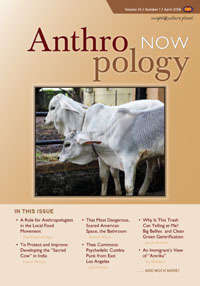Along with Samuel Gerald Collins, Matthew Durington, Paolo Favero, Krista Harper, and Ali Kenner we recently published an essay titled, “Ethnographic Apps/Apps as Ethnography,” in Anthropology Now. You can find the article online here.
Today, people nearly everywhere are ex-periencing multiple events through the medium of mobile apps: Social networking platforms, such as Twitter, Facebook and In-stagram, are now accessed through smart-phones by most users; popular service apps like Yelp are used for finding restaurants and services; geolocation apps for way finding, such as Google Maps, plot drives, commutes by public transportation and even walks around the block; and there are tons of per- sonal health and Fitness trackers that count everything from steps to calorie intake. For anthropologists, mobile apps provide the op-portunity for an enhanced methodological approach that provides new possibilities to engage with the people they study, heighten their reflexive capacities and link to new forms of data. While many approach these possibilities with trepidation, our collective sentiment is that these new forms of commu-nication provide more promise than pitfalls for anthropology.

